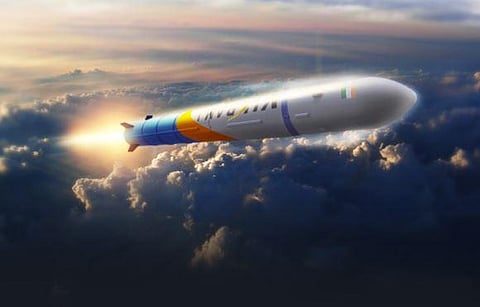

HYDERABAD: City-based aerospace company Skyroot is preparing for an orbital launch called Vikram-1, which they plan to launch soon. Speaking to TNIE on the sidelines of the AI Summit on Thursday, co-founder Bharath Daka shared, “The Vikram-1 will put a satellite in orbit. The launch vehicle is much bigger, equivalent to a seven-story building, and is a multi-stage rocket. We are aiming for the launch, hopefully by this year end or early next year."
Another aerospace company, Dhruva Space, recently announced the LEAP-3 mission. Dhruva Space CEO Sanjay Nekkanti told TNIE, “In the LEAP-3 mission, we are handling the first payload for different customers. It will be launched through SAT search. Next year is going to be busy, with several launches planned. We have at least two to three microsatellites lined up for launch, along with a few more P-Dot series satellites for additional customers.”
About the earlier announced meeting with SpaceX founder Elon Musk, he said, “We are building a business that could potentially scale globally. The idea was to explore different opportunities for collaboration, either as a vendor or service provider.”
For Daka, the meeting announced in April would have been a chance to showcase their work to the SpaceX founder. “The prime minister had asked Musk to meet space startups in India, and we would have presented our work to him. Musk and others like him are the ones who inspired us to believe in the possibility of space exploration,” he added.
He also praised Hyderabad’s growing ecosystem for startups, mentioning the role of T-Hub. “There are more solid foundation companies coming to Hyderabad, and the AI Summit is a great initiative. Setting up data centres and providing common high-performance computing facilities at T-Hub allows AI startups to hit the ground running without much capital investment,” Daka noted.
During the session, Jayesh Ranjan, Special Chief Secretary of the ITE&C Department, asked about the possibility of space tourism. “It won’t be as affordable as a flight ticket, but within a decade, space travel will be a pleasure trip that some people can afford. The cost of space access will determine the viability of such applications,” Daka said.
Nekkanti added that children born in this decade are likely to witness these advancements. “Permanent settlements in space may take more time, but making space accessible to a wider population and offering trips around the Earth is definitely possible within the next 15-20 years,” he predicted.